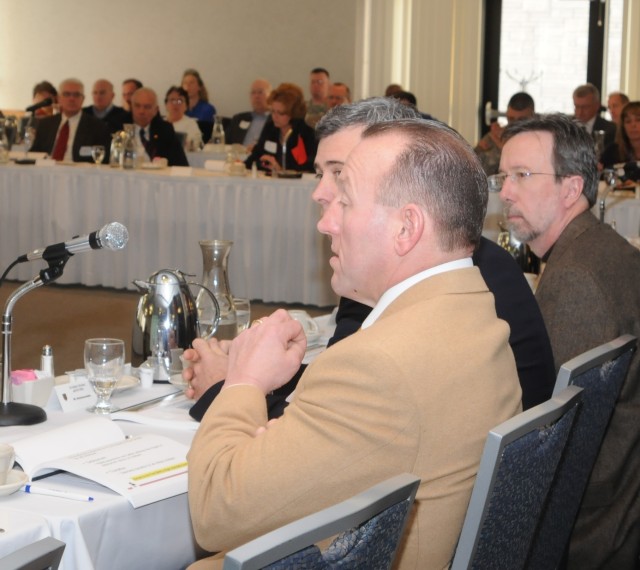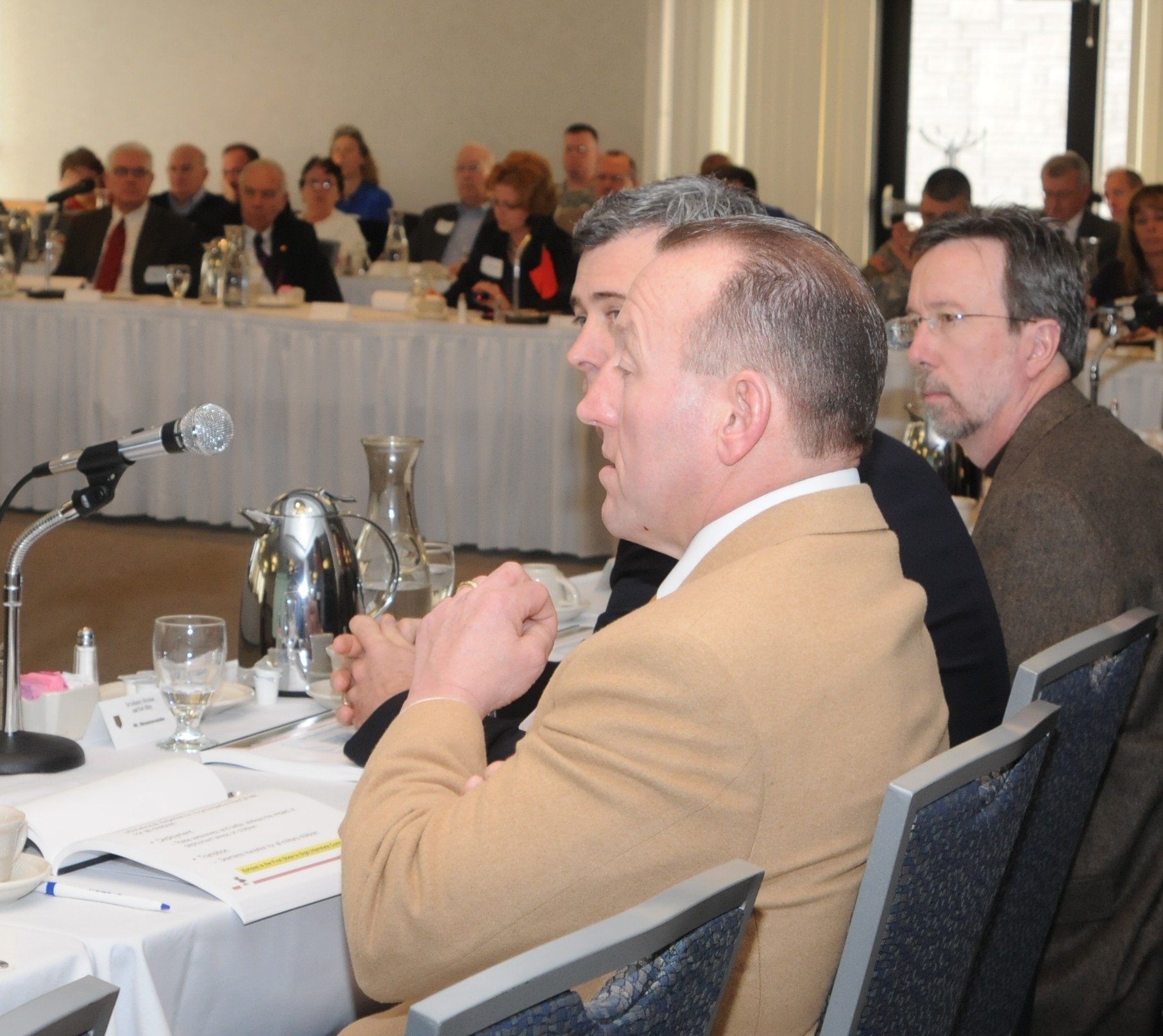FORT RILEY, Kan. -- Elected officials, educators and Army and community leaders met Jan. 30 at RileyAca,!a,,cs Conference Center on Fort Riley for a Community Partnership Conference concerning education in the Central Flint Hills Region.
About 120 participants filled a large room at RileyAca,!a,,cs for an update on a variety of challenges and success stories.
At the start of the conference, Craig Phillips, Chief of the Conservation and Restoration Branch of the Directorate of Public WorksAca,!a,,c Environmental Division, gave an overview of the Army Compatible Use Buffer program. The program allows Fort Riley to purchase conservation easements through its partner, the Kansas Land Trust, to help prevent encroachment. Encroachments can lead to training restrictions on post and may stem from such factors as noise complaints or rare and endangered species habitat losses.
Ken Steggeman, Director of Human Resources, then presented results of the Fort Riley Military Family Survey from June 2008.
Of 1,221 respondents, 764 were Soldiers and 457 were spouses. When asked their reasons why Families accompanied Soldiers to Fort Riley, 181 or 14.8 percent of those surveyed cited educational opportunities for spouse or children. Conversely, when asked why their Family did not accompany the Soldier to Fort Riley, 55 of the 235 respondents surveyed who came to Fort Riley by themselves cited the same reason: educational opportunities for spouse or children.
The survey also questioned respondents about areas of most satisfaction. More than 48 percent said educational opportunities for spouses off post, while more than 46 percent said the same for children off post.
Good news came in results from a survey question asking about areas of least satisfaction at Fort Riley, in which educational opportunities were not among the top seven areas. The School of Family Studies and Human Services within Kansas State UniversityAca,!a,,cs College of Human Ecology performed the survey.
Mark Sodamann, the postAca,!a,,cs Education Services Officer, then addressed post secondary education objectives. Sodamann described some of the challenges facing Soldiers on deployment. He mentioned long duty hours due to deployment preparation and continuous operations during deployments as examples of factors making it difficult for Soldiers to proceed with their education plans.
Aca,!A"Our Family members we work with also have some challenges,Aca,!A? Sodamann said. Aca,!A"These are what our objectives need to address. ThereAca,!a,,cs absence of a servicemember, thereAca,!a,,cs stress, thereAca,!a,,cs also financial considerations for tuition and other things they have to meet to obtain a post secondary education.Aca,!A?
Sodamann also spoke of achievements since the first education CPC last June. He said one challenge he and his partners in education on and off post were given was to meet the needs of Soldiers in a constant cycle of training, and deployment.
Aca,!A"We are now able to deliver programs at the unitAca,!a,,cs request, at the SoldierAca,!a,,cs request, either in classroom, or online or in theater overseas,Aca,!A? he said.
The ArmyAca,!a,,cs Troops to Teachers program on post also has shown success on post, Sodamann said. The program assists Soldiers in their transition to a second career as teachers, providing information on state licensure programs, teacher examination preparation and financial assistance.
In 2007, three Fort Riley Soldiers registered with the program and one was hired as a teacher. Last year, eight more registered and four were hired.
Susan Helbert, assistant director for the Kansas State Department of EducationAca,!a,,cs Teacher Education and Licensure team, announced recent changes that provide better access to teachers who transfer to other posts.
Helbert told the group one goal of changing the licensure system is to remove some of the barriers faced by out of state applicants. Changes include dropping the grade point average requirement, reducing by half the renewal requirements for retirees and issuing emergency substitute renewals for two school years.
Aca,!A"WeAca,!a,,cre creating a particular license which weAca,!a,,cre very proud of that lets those classroom teachers take on additional roles as leaders without moving into that administrative level,Aca,!A? Helbert said. Aca,!A"And then weAca,!a,,cre creating a path to school counselor licenses for someone that does not have a teaching background, which has been the traditional path in Kansas.Aca,!A?
Nikki Crisman, Child, Youth and School Services coordinator, talked about raising awareness and addressing the impact of deployment stress on children. She also spoke of ensuring a seamless transition for all military children when they are forced to change schools.
Aca,!A"Some Families find it difficult to transfer records. Some Families find it difficult to move in and out of districts when graduation requirements are different from state to state,Aca,!A? Crisman said.
Helping to ensure that transition is smooth is the new Interstate Compact on Educational Opportunity for Military Children signed last April by Kansas Gov. Kathleen Sebelius. The compact, developed by the Council of State Governments, education experts and the Department of Defense, addresses common problems that affect military students as a result of frequent moves and deployments.
States that sign on to the compact agree to work collectively with other compact states to create uniform standards of practice. Such practices include the transfer of records, course placement, graduation requirements, redundant or missed testing, entrance-age variations and other transition issues.
Following a brief lunch break and discussion, participants produced a list of actions for community partners to work on. These included more effective marketing of teacher education programs, inviting state licensure staff to Fort Riley and job fairs, marketing the area schools collectively as the Central Flint Hills Region and discussing the issue of children not attending school during their parentsAca,!a,,c block leave. The Aca,!A"due outsAca,!A? also included development of a local action plan outlining strategies and timelines to minimize challenges caused by numerous transitions and deployments for military-connected students.
Education had been selected as a CPC topic because area leaders consider it a key quality of life factor for Soldiers and Families, who tend to pursue assignments where they will have access to quality schools for themselves and their children.
The next CPC will revisit employment opportunities and is set for February 26 at RileyAca,!a,,cs Conference Center.


Social Sharing